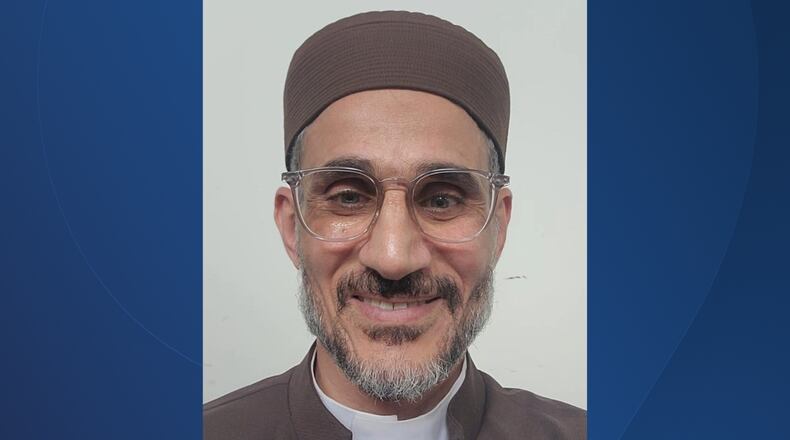Soliman is listed as a board member for both the Islamic Association of Cincinnati and the Initiative on Islam and Medicine. His biography for the Initiative on Islam and Medicine’s website says he also served as an imam in Egypt for 14 years before moving to the U.S.
Since arriving in America, he has served as a chaplain at Northwestern University and a chaplain in the prison system before becoming the imam and chaplain at Cincinnati Children’s.
In an interview with state Rep. Munira Abdullahi before going into his check-in, Soliman says he was granted asylum status in 2018 after first coming to the U.S. on a temporary visa in March 2014. He applied for his green card in 2019. Then, after six years of waiting, they terminated his status and denied his green card.
According to Soliman’s attorneys, in February 2015, Soliman applied for asylum, and in June 2018, his asylum claim was approved. However, his status began to change during the final months of the Biden administration.
In December 2024, about 12 days after a judge allowed one of his lawsuits against federal agencies to proceed, Soliman was notified that the process to revoke his asylum status was beginning. By early June 2025, his asylum was officially revoked.
Why Soliman left Egypt
Jump told WCPO that Soliman ran from government persecution in Egypt while working as a journalist. Jump said he was jailed and tortured while there.
“As a journalist in Egypt reporting on the revolution there, he underwent much torture,” Jump said.
Usually, people seeking asylum, like Soliman, can stay in the U.S. while officials review their cases, and after they receive approval, according to immigration attorneys working with the imam. However, if the government revokes asylum status, those individuals can be deported.
Soliman said he had an immigration hearing scheduled for July 3 that was then rescheduled before he received a notice about a check-in.
“A couple days later, I got the notice to appear in one of the ICE offices in Blue Ash ... my attorney told me this is just supposed to be a regular check-in ... but it’s just too much, you never know,” Soliman said.
Abdullahi asked Soliman if he wanted to say anything in case something happened at the check-in.
“If anything happens ... going back to Egypt for me is a death sentence,” Soliman said. “I didn’t come to America seeking a better life. It was escaping death ... from the regime and his supporters.”
Soliman’s legal battle with the U.S. federal government
Federal court records obtained by WCPO 9 News show Soliman has filed multiple lawsuits against federal government officials and agencies, including the FBI’s Threat Screening Center, formerly known as the Terrorist Screening Center. In his initial 2022 lawsuit, Soliman says he had a job offer rescinded because his background check came back with an FBI flag.
In the lawsuit, Soliman claims his fingerprints did not match prints recorded in the government’s terrorism screening database.
“They were telling us that they were detaining gangsters, and rapists and drug dealers. Now they’re detaining faith leaders,” said Khalid Turaani, CAIR executive director.
According to his lawsuit, Soliman was trying to confirm his status and learn why he appeared to be on a federal watchlist despite not having a criminal record.
Community members from various faiths gathered outside the ICE facility in Blue Ash on Wednesday to demand answers and call for Soliman’s release.
“We are all here in support of him, and we’ll continue to fight for him and do what we can. We are shocked as a community who is already vulnerable, who feels targeted,” said Tala Ali, Clifton Mosque chairperson.
Rep. Abdullahi joined the rally, saying, “Ayman came here seeking peace and safety.”
“We’re here calling for his release and not only his release but also reforming of a system that takes people away from their families. We saw mothers come in with their little children, terrified that they might not come out today. This is not the America that I know, as a refugee who came here also seeking safety,” Abdullahi said.
Many supporters spoke of Soliman’s contributions to his local mosque and his impact at Cincinnati Children’s, where he served as the first and only Muslim chaplain. Soliman has family, including a wife and children in Egypt, whom he was hoping to bring to the United States.
About the Author
